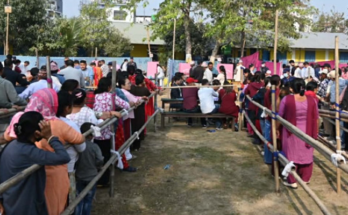Athens, Greece – In a dramatic security breach with international implications, four Chinese nationals — including a woman — were arrested in Tanagra, Greece, after they were caught photographing Rafale fighter jets and recording footage of the Hellenic Aerospace Industry (HAI) facilities, a sensitive military site.
The group’s suspicious activity near the 114th Combat Wing triggered a high-alert response from Greek authorities. According to India Today, Hellenic Air Force Police handed the individuals over to local law enforcement after they were found capturing visuals of restricted zones, raising concerns over possible espionage.
HAI security staff first noticed the individuals and asked them to leave the premises. Undeterred, they reportedly shifted to a nearby bridge and continued taking photographs. The Air Force Police intervened swiftly, apprehended the group, and transferred them to the Tanagra police station for further questioning.
Initial investigations revealed they were carrying a substantial amount of visual data from the military zone. Authorities are now probing whether this was an isolated incident or part of a broader intelligence-gathering operation.
Global Disinformation Campaign Linked
The arrests come amid explosive allegations from French military sources that China has been conducting a coordinated global campaign to discredit the Rafale fighter jet — a key export of France’s defence industry and a frontline aircraft for the Indian Air Force.
A report by Associated Press cited French intelligence accusing Chinese embassies of running a covert disinformation campaign following India’s high-profile use of Rafale jets during Operation Sindoor in May. The campaign allegedly included fake social media posts, AI-generated content, doctored images, and simulated combat footage meant to show the Rafales underperforming.
Over 1,000 new accounts reportedly emerged during the India-Pakistan border tensions to push content favoring Chinese defence systems while undermining the French jet’s credibility.
French military officials believe this digital offensive aimed not just at harming Dassault Aviation’s market, but at eroding France’s image as a provider of reliable, autonomous defence technology.
“The Rafale wasn’t targeted by chance,” said France’s Ministry of Armed Forces. “This is about more than a fighter jet — it’s about strategic autonomy, industrial trust, and global partnerships.”
China Denies Allegations
In response, China’s Ministry of National Defence rejected the accusations as “groundless rumours and slander.” The state-run Global Times reiterated Beijing’s commitment to responsible arms exports and criticized what it called Western paranoia and projection.
“China has no intention of becoming an arms dealer by tarnishing others,” the ministry said, asserting that its defence strategy is focused solely on national security.
Strategic Context
The Rafale jet has become a central piece of India’s airpower strategy, with the Indian Air Force using it in joint drills with Greece, including INIOCHOS 25. India and Greece have expanded military cooperation in recent years, further adding weight to the latest developments.
Dassault Aviation has sold 533 Rafale jets globally, with 323 already delivered to countries like India, Egypt, Qatar, the UAE, and Indonesia — the latter planning to buy more.
With security services now reviewing the material seized from the Chinese nationals in Tanagra, the incident has raised fresh alarms about the intersection of espionage, digital warfare, and global arms competition.




